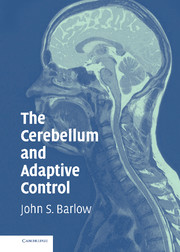Book contents
- Frontmatter
- Contents
- Preface
- Acknowledgments
- PART ONE ANATOMY AND PHYSIOLOGY OF THE CEREBELLAR SYSTEM
- PART TWO CEREBELLAR FUNCTIONS
- PART THREE MODELS AND THEORIES
- 13 Nonadaptive Models, Forerunners of Adaptive Models, and Earlier Adaptive Control Models
- 14 Neural Networks and Adaptive Control: Neural Network Models
- 15 Specific Features of Adaptive Controllers and Adaptive Signal Processors
- 16 Adaptive Control Models
- PART FOUR SUMMARY AND CONCLUSIONS
- APPENDIX A A Hybrid Analogue/Digital Multiplexer/Multiplier-Based Adaptive Signal Processor
- Author's Note
- Bibliography
- Index
16 - Adaptive Control Models
Published online by Cambridge University Press: 28 October 2009
- Frontmatter
- Contents
- Preface
- Acknowledgments
- PART ONE ANATOMY AND PHYSIOLOGY OF THE CEREBELLAR SYSTEM
- PART TWO CEREBELLAR FUNCTIONS
- PART THREE MODELS AND THEORIES
- 13 Nonadaptive Models, Forerunners of Adaptive Models, and Earlier Adaptive Control Models
- 14 Neural Networks and Adaptive Control: Neural Network Models
- 15 Specific Features of Adaptive Controllers and Adaptive Signal Processors
- 16 Adaptive Control Models
- PART FOUR SUMMARY AND CONCLUSIONS
- APPENDIX A A Hybrid Analogue/Digital Multiplexer/Multiplier-Based Adaptive Signal Processor
- Author's Note
- Bibliography
- Index
Summary
Some Additional Terminology
In this chapter, which can be considered a continuation of Chapter 14, the emphasis is entirely on adaptive control. To reiterate the definition, an adaptive control system has been defined as one that automatically changes its parameters in accordance with detected or measured changes in its environment. Such changes affect only the values of the parameters but not the structure of the system (Kalman and Bucy 1961); thus, the term optimal filter is sometimes used. By definition, an adaptive system is free of the requirement of stationarity (i.e., constancy of statistical characteristics) of its input signals. The term self-optimizing, implying that a system organizes itself, has also been used (Gibson 1963; Widrow 1963).
In brief, adaptive controller has been defined as a controller with adjustable parameters and a mechanism for automatically adjusting the parameters.
Accounts of the history of adaptive control can be found in Gibson (1963), Åström and Wittenmark (1995), and Isermann, Lachmann, and Matko (1992).
Adaptive Control vs. Adaptive Signal Processing
To make the distinction between the two clearer, adaptive control and adaptive signal processing have strong similarities; that is, similar mathematical models and techniques are used in the two fields (Åström and Wittenmark 1995). However, there are also some significant differences. For example, the time scales can be different. Thus, adaptive signal processing often deals with rapidly varying (higher frequency) signals, as in acoustics, in which sampling rates of tens of kilohertz are needed, and hence more emphasis is given in signal processing to fast algorithms.
- Type
- Chapter
- Information
- The Cerebellum and Adaptive Control , pp. 247 - 270Publisher: Cambridge University PressPrint publication year: 2002



